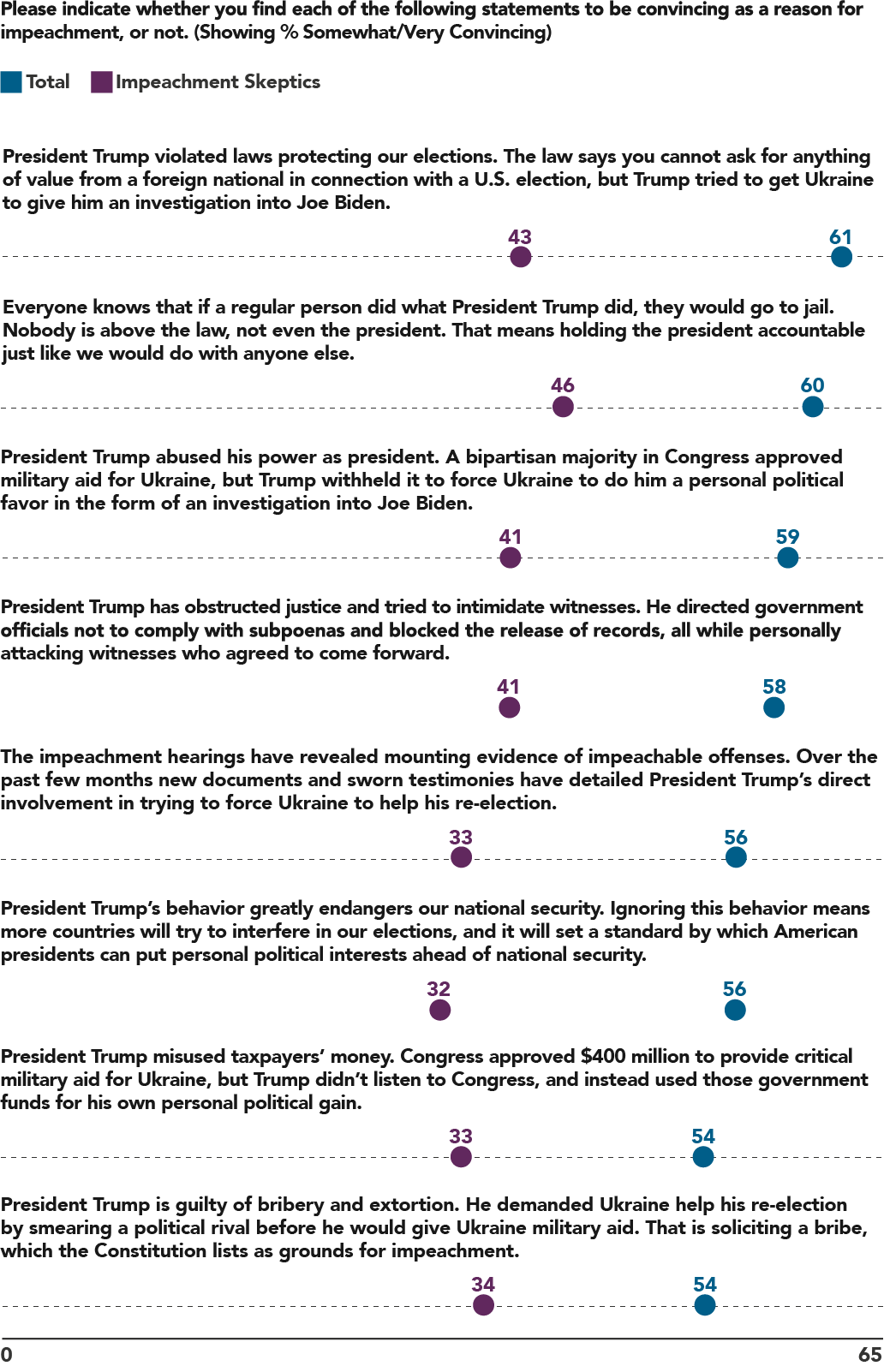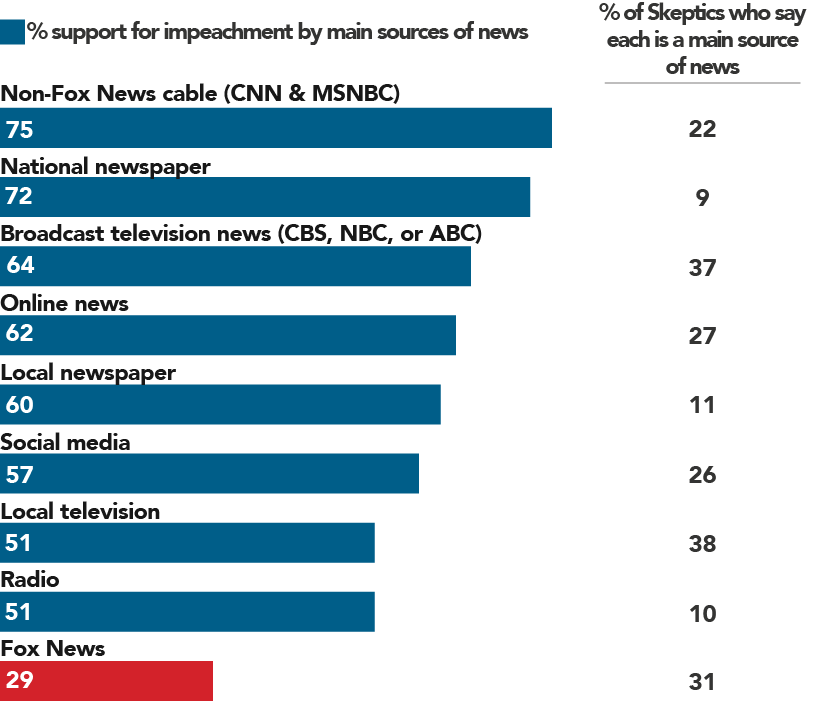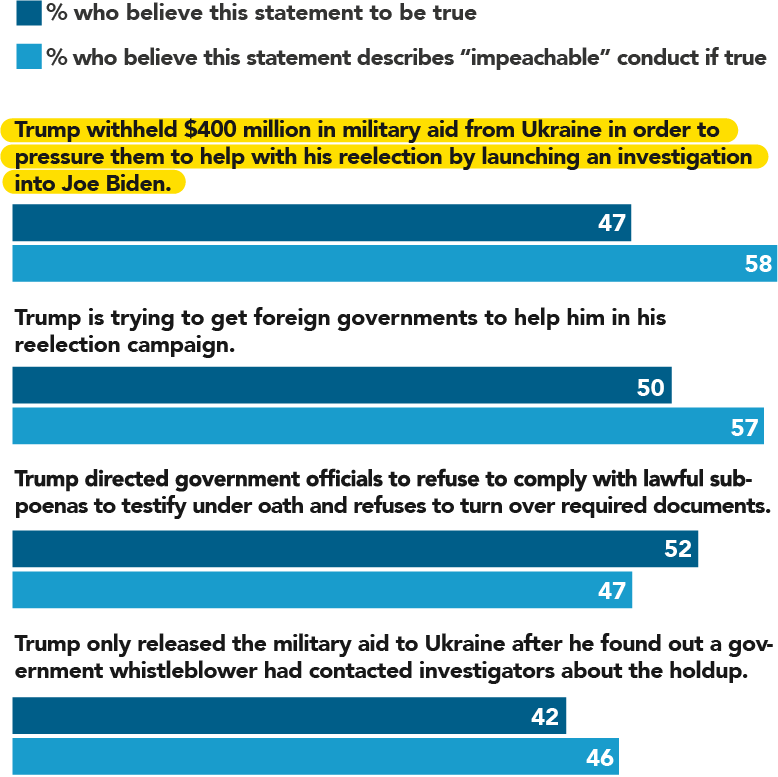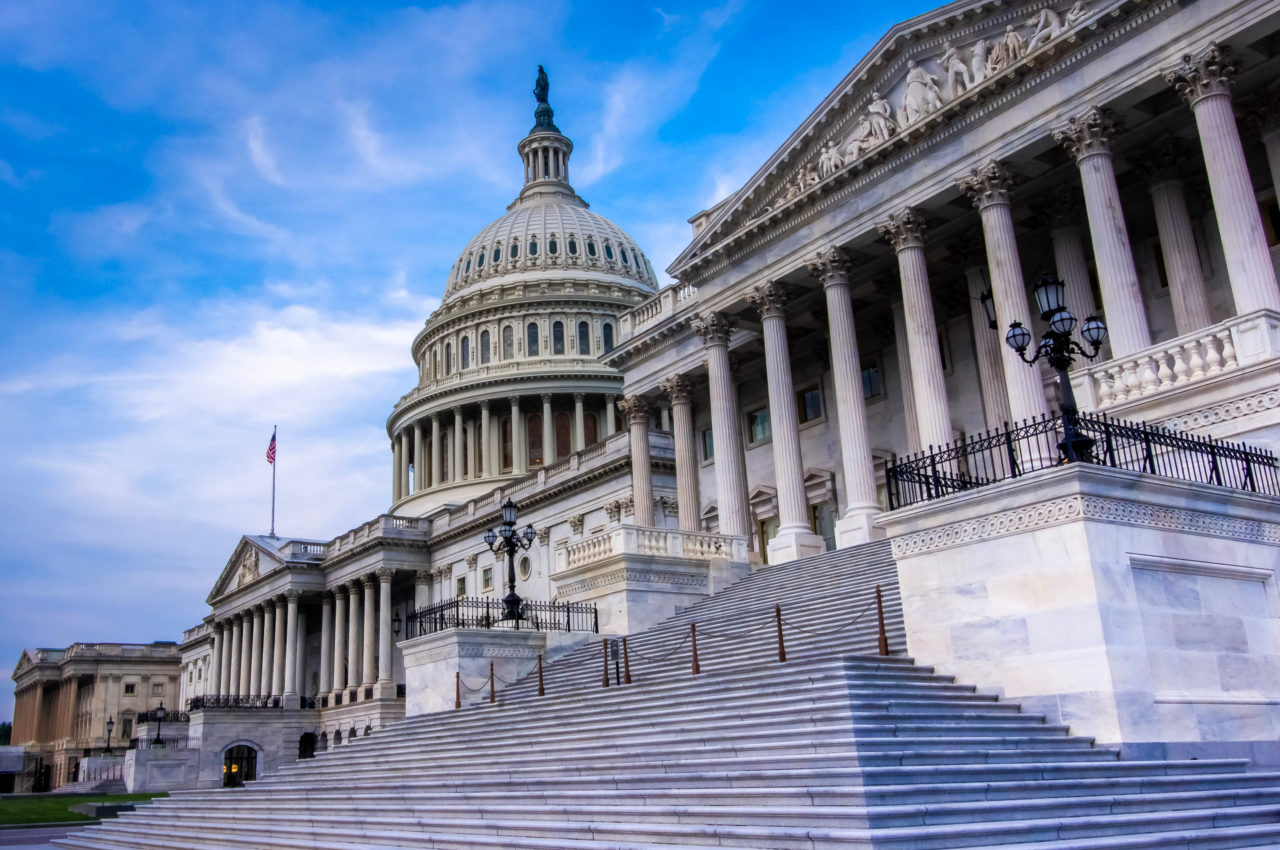Every month, we pick a few topics for exploration. The topics we select aren’t meant to cover every issue area facing the progressive community, but rather to give actionable advice on how to talk about key issue areas. This month we focused on:
Democrats in the House Intelligence Committee recently concluded public hearings with key witnesses. How can progressives make the case for impeachment as the House of Representatives prepares to vote on it?
“Abuse of power” remains the most effective way to describe President Trump’s wrongdoing, but other messages can help support and complement the abuse of power case.
Support for impeachment has held steady from the beginning of the inquiry and through the public hearings.
The latest Navigator poll finds support for House Democrats’ impeachment inquiry is steady compared to our past surveys conducted in October and November, with 51% of Americans in favor of impeachment and 43% of Americans opposed. It was 52% in favor and 41% opposed last month, and 52% in favor and 43% opposed in October.
Following public hearings in the House, there is still a sizable segment of “soft” opposition and those undecided about impeachment. While support for impeachment holds firm, there remains an additional segment of Americans not yet decided – though they mostly lean toward opposition to impeachment. This 23% of “soft” opposition and undecideds – we call them “Impeachment Skeptics” – include the following groups:
- 6% who are undecided about whether to impeach Trump;
- 11% who believe he may have done something wrong, but are not ready to say it justifies impeachment;
- 4% who oppose impeachment despite believing Trump committed impeach- able offenses, who would prefer to wait for the next election to let the public weigh in; and,
- 2% who did not offer a reason for opposing impeachment.
There is support for a pro-impeachment vote in Congress.
As members of Congress prepare for a vote on impeachment, 51% of Americans want their representative to vote in favor of impeachment, while 40% want their representative to vote against. This 11-point edge is virtually identical to (and marginally larger than) the 8-point edge in support for impeaching Trump overall.
Moreover, sixty-three percent of Americans think Trump has definitely or probably abused his power while president, including 59% of independents who agree. This holds even among subgroups favorable to the president, such as white non-college educated Americans (54%) and those who live in rural areas and small towns (55%). Fifty-seven percent also believe Trump definitely or probably committed a crime while president.

Trump and Republicans in Congress have a “rule of law” problem.
While opinion appears somewhat hardened on impeachment, Democrats have a lead on the underlying issues of law and order. By eight points, Democrats are more trusted than Trump to protect law and order (47% vs. 39%).
Democrats in Congress also now lead Republicans on the issue of “rule of law.” There was once a Trump gap – Democrats had a clearer advantage against Trump than against Republicans more broadly. But Trump and Republicans now fare similarly poorly relative to Democrats, with Democrats leading Republicans on “the rule of law” by 8 points (43% to 35%), compared to a virtual tie (36% to 37%, technically a one-point deficit) in April.
A divided country – but Democrats are more trusted on the inquiry.
Views on the facts and motivations behind impeachment are unsurprisingly divided. Yet again, Democrats continue to have an advantage.
- Overall, 43% of Americans approve of how Democrats have handled the investigation, while 42% disapprove. Republicans are underwater on this question, at 36% approve – 44% disapprove.
- Americans say Democrats are “following the facts” by 48% to 39%, but say Republicans have not been by 45% to 40%.
- Fewer also believe the Republicans have kept an “open mind” (35% say this applies
to Republicans, 44% to Democrats) and slightly more say Republicans have been “trying to mislead” the public about the case (49% for Republicans, 44% for Democrats).
There is more than one effective explanation for an impeachment vote, but “abuse of power” remains a resonant theme – along with the idea that no one is above the law.
The latest Navigator poll explored several of the core impeachment arguments to determine how serious and convincing each is. Regardless of the frame, about half of Americans (ranging from 49% to 52%) rate each of the statements as “serious” with few agreeing they were just about “political points” (ranging from 29% to 34%).
The majority of Americans also view each statement as at least “somewhat” convincing, providing impeachment supporters multiple viable options. But among “Impeachment Skeptics,” who are most persuadable, the most effective statements focused on four key themes about the president’s misconduct:
- Trump violated election laws.
- Trump did things regular people would go to jail for (and “no one is above the law”).
- Trump abused his power.
- Trump obstructed justice.
Lt. Col. Alexander Vindman is a powerful validator
Respondents in the survey read a short excerpt from Lt. Col. Vindman’s testimony, explaining that he reported his concerns about Trump’s dealings with Ukraine “out of a sense of duty.” Respondents also saw an image of Vindman in his uniform, and similar excerpts from testimony by Jennifer Williams, Bill Taylor, Gordon Sondland, and David Hughes. 46% of respondents found Vindman’s words “very concerning” – higher than any of the other witnesses tested.

A challenge to messaging on impeachment: breaking through Americans’ media filter bubbles.
One hurdle facing impeachment supporters is delivering their message to the Americans who have not already firmly decided either way. While the great majority of Americans (65%) say they are following the impeachment process at least somewhat closely, this number is just 43% among the “Impeachment Skeptics,” our group of soft opponents and undecideds.
Moreover, just 13% of true undecideds (those who say they are not sure whether they support or oppose impeaching Trump) have watched “some” or “a lot” of the live hearings, compared to 46% of Americans overall.
Americans who may be persuadable on impeachment also appear harder to reach.
Previously, Navigator Research examined those inside and outside the “FoxHole” – and found vast differences between those who say they watch Fox News regularly and those who don’t. The same dynamic is clear on the issue of impeachment: Republicans who watch Fox News oppose impeachment by 76 points, com- pared to Republicans who don’t watch Fox News who oppose impeachment by a smaller 62-point margin.
But news diet more broadly is clearly associated with differences in opinion regarding impeachment. While support for impeach- ment is 75% among Americans who name CNN or MSNBC as a main source of news, the number drops to 51% for local news audiences and 29% for Fox News. Skeptics, meanwhile, are most likely to name local TV, broadcast channels, Fox, or online sources as their main sources of news.

Keep communicating: while many remain unsure about the facts, Trump’s withholding $400 million in military aid to help his own reelection remains “impeachable” in the eyes of the majority.
Notably, while just 51% of Americans support impeachment personally, a larger majority (58%) believe the core example of misconduct – that Trump withheld $400 in military aid for per- sonal gain – rises to the level of “impeachable if true.” However, only half of Americans believe either of these allegations to be “true” while roughly a fifth remain “not sure. This underscores the importance of continuing to hammer home the key facts of the impeachment case.

